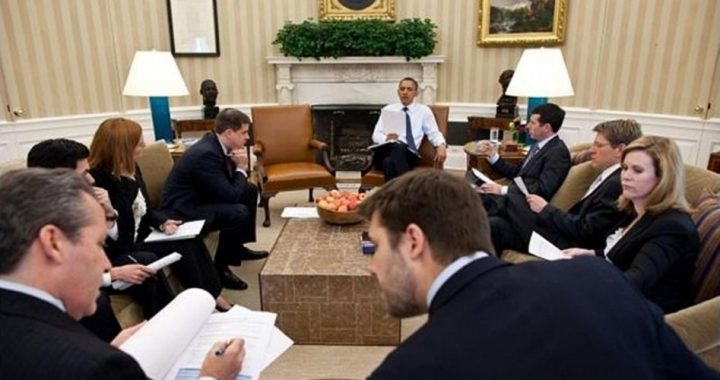
The White House claims that killing Americans without due process is “legal,” “necessary,” “ethical,” and “wise.”
In commenting on a white paper released by the Justice Department and obtained by NBC News, White House Press Secretary Jay Carney used these words to describe the targeted assassination of American citizens overseas. Those marked for death by drone are those believed by the president to be collaborating (in a notably undefined manner) with “al-Qaeda and its associated forces.”
In a footnote, the Justice Department explains that the “laws of war” will be used to determine whether a group is a “co-belligerent” with al-Qaeda. That is the sum of the guidance and notice given to those Americans residing overseas who might unknowingly be targets for the next Hellfire missile.
The timing of the release of the 16-page memo is curious given that on Thursday hearings will begin on the confirmation of President Obama’s choice for CIA director, former counterterrorism czar John Brennan.
The presidential presumption of guilt by association followed by the autocratic order of a lethal drone strike rightly worries constitutionalists and friends of liberty. In fact, many questions prompted by the president’s drone program remain unanswered. For instance, why can’t these alleged “terrorists” be tried in our federal court system? For decades those accused of terroristic crimes have been formally charged with those crimes, had those charges heard before an impartial federal judge, and been permitted to mount a defense to those crimes.
In fact, a survey of such trials conducted by Human Rights Watch reported, “Federal civilian criminal courts have convicted nearly 500 individuals on terrorism-related charges since 9/11.”
Add to this the story of Timothy McVeigh, who was executed in June 2011 for the Oklahoma City bombing, the worst terrorist act on American soil until 9/11. Extending the full panoply of due-process rights — including a trial in federal court — did not allow McVeigh or other convicted terrorists to evade justice. Furthermore, the purpose of protecting and providing civil liberties to those accused of crimes is not to set the guilty free, but to avoid punishing the innocent who are wrongly accused of crimes.
And should the president suggest that alleged evildoers cannot be apprehended, he should be reminded that “public enemy number one” Osama bin Laden was reportedly tracked and overtaken by a U.S. special operations team. Why could other less high-value targets not be similarly found by the military? Although bin Laden was reportedly killed in the raid, there is every reason to believe that a team skilled in this type of operation could have captured him alive if those had been the orders they were following.
Once in the custody of the United States, these suspects could be brought to stand trial for their alleged crimes. This would preserve, protect, and defend the fundamental concept of due process, one of the pillars of liberty upon which our Constitution is built.
Due process as a check on monarchical power was included in the Magna Carta of 1215. This list of grievances and demands codified the king’s obligation to obey written laws or be punished by his subjects. Article 39 of the Magna Carta says: “No freemen shall be taken or imprisoned or disseised [dispossessed] or exiled or in any way destroyed, nor will we go upon him nor send upon him, except by the lawful judgment of his peers or by the law of the land.”
Over the years, the Magna Carta was occasionally revised and amended. In 1354, the phrase “due process of law” appeared for the first time. The Magna Carta as amended in 1354 says: “No man of what state or condition he be, shall be put out of his lands or tenements nor taken, nor disinherited, nor put to death, without he be brought to answer by due process of law.”
This fundamental restraint on the royal presumption of the power to lop off heads on command was incorporated by our Founders in the Bill of Rights, particularly in the Fifth Amendment, which says in relevant part: “No person shall … be deprived of life, liberty, or property, without due process of law.”
President Obama’s nearly daily approval of drone-delivered assassinations is an effrontery to over 650 years of our Anglo-American law’s protection from autocratic decrees of death without due process of law. When any president usurps the power to place names on a kill list and then have those people summarily executed without due process, he places our Republic on a trajectory toward tyranny and government-sponsored terrorism.
Of course, it would be another matter if those targeted and executed by the president were armed enemy combatants — they were not. Were these suspected “militants” enemy soldiers captured during wartime, they would be necessarily afforded certain rights granted to POWs. Those slated for assassination are not allowed any rights — neither the due process rights given to those accused of crimes nor the rights of fair treatment given to enemies captured on the battlefield. The White House has assumed all power over life and death and created ex nihilo a new category of individual — one deprived of all rights altogether.
In the newly released memo, the Justice Department insists that such life or death decisions will be handled by “an informed, high-level official of the U.S. government.” That is hardly sufficient protection of the due process rights of Americans. Due process requires that the suspected terrorist “co-belligerent” be charged with a crime, allowed to answer those charges, and defend himself against those charges before an unbiased judge in court.
The memo argues that such constitutional procedures must be by-passed in the name of national security, arguing that the safety of America is more important than the constitutionally protected rights of one individual. Furthermore, the memo claims that only those who pose an “imminent threat of violent attack against the United States” will be targeted.
When Jay Carney was asked by a reporter to explain how 16-year-old Abdulrahman al-Awlaki qualified for government-sanctioned murder according to the guidelines set forth in the memo, Carney was stumped. “I’m not going to talk about individual operations that may or may not have occurred,” he responded.
Abdulrahman al-Awlaki was killed in October 2011, and to date the Obama administration has never informed the country of any wrongdoing by this teenager, other than being related to a man (his father, Anwar al-Awlaki) who posted on the Internet anti-American videos that allegedly influenced others to commit crimes. A government-sanctioned assassination of such an individual is repugnant to all those who cherish life, liberty, and the due process that protects them.
An additional denial of due process came from the fact that no known attempt was ever made to capture this young man and take him into U.S. custody. Of course, that could be because he might actually have ended up in a court of law if he had been apprehended; and President Obama, a former lawyer, knows that trials can be long, messy, and unpredictable. It is much quicker and cleaner just to launch a missile and kill someone without going through the hassle of due process.
Finally, with regard to civilian casualties, not even the White House claims that Abdulrahman al-Awlaki was a member of al-Qaeda or any associated group believed to pose a threat to the United States. He was quite literally killed for being associated with one who was allegedly associated with those allegedly associated with al-Qaeda.
As with so many autocratic acts of the Obama administration, this memo raises more questions than it answers. For example, how imminent must an attack be and what standard is used to measure the legitimacy of the threat?
In an NBC News story on the memo, Michael Isikoff remarked that it “does not require the United States to have clear evidence that a specific attack on U.S. persons and interests will take place in the immediate future.” If that isn’t the definition of “imminent” then what is? Isikoff reported that the memo makes exception to the “imminent” standard for those suspected threats who are suspected of having “recently” participated in “activities” that may some day threaten national security.
As in so many other instances, this memo leaves key terms — “activities” and “recently” — undefined.
The Justice Department is crawling with attorneys schooled in the importance of specificity of language. They know that vague, equivocal wording is contrary to good law and that innumerable statutes are struck down by courts all over the country on that very account.
If these men and women in the Justice Department (and the White House, for that matter), so many of whom are trained in the law, meant to explicitly and clearly define the conditions that must be met before the president can order the unconstitutional assassination of American citizens, they could have done so. The irrefutable fact is that they chose not to. Rather, they chose to leave that option open.
More importantly, the memo meant to justify the government-sanctioned murder of Americans is loaded with key terms that are so ill defined that they are ripe for the wresting, and within the penumbras of these cleverly crafted provisions may be found the tools of tyranny. Wrenches that could torque any American living or working overseas into a predetermined “terrorist” slot.
Joe A. Wolverton, II, J.D. is a correspondent for The New American and travels frequently nationwide speaking on topics of nullification, the NDAA, and the surveillance state. He can be reached at [email protected].



